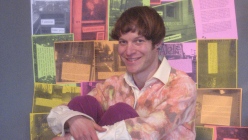The End of San Francisco, out by City Lights last month, is Mattilda Bernstein Sycamore’s potent memoir about longing: longing for good sex, meaningful relationships, a father’s admission of sexual abuse, an LGBT community that supports and questions itself, and most longing for release. The most surprising truth in this memoir is the crux of Sycamore’s appetite — her appetite for seamless belonging is equally matched by an agitated addiction to pursue and lose herself in her ecstasies, a road that she dutifully travels each time only to discover that her ecstasies are ephemeral and haunting.
Written in nine parts, The End of San Francisco is a conversational, disordered account of the author’s anxiety-riddled childhood, her sexual encounters, and a life of clubbing, partying, and stirring activism. The writing is urgent, poignant, high-pitched, then expository. But it is this unevenness that makes the book sound more like an authentic monologue: Sycamore alternately purring in your ear, yelling in your face, or sedately stating the intricacies and repressions she sees in the LGBT community.
The first part of the book is harrowing, as Sycamore shares her charged return home. To Sycamore, home is a place of exile. Her family calls her “Matthew” — there is a layer of terror to the telling. She is there to confront her father, who is heavily medicated and on his deathbed, to ask him once again to admit to the sexual abuse. It is unclear how much is getting through to her father and there is no answer on his part. Sycamore writes, “then there are so many layers to my sobbing: there’s holding the chest while spasming anyway; there’s tears gliding smoothly down skin; there’s tears in eyes, face, inside everything.”
This book is filled with sounds of the 1990s club scene. Some of the most beautiful writing is on the experience of dancing, perhaps heightened by the fact that Sycamore suffers from fibromyalgia, making it sometimes painful to dance. Here is Cajmere’s “Brighter Days,” which I recommend you listen to as you read Sycamore’s writing on the experience of dancing to it just beneath:
“Screaming when the beat got knock-you-down over-whelming and breathe-deep soothing at the same time or that sample came at the exact moment when you couldn’t possibly handle it or just because you saw the wrong person at the right time or the right person at the wrong time or because there was something missing I mean there was nothing missing for just that moment with the sweat pouring down your face your eyes bringing the beat into your body your body taking it.”


